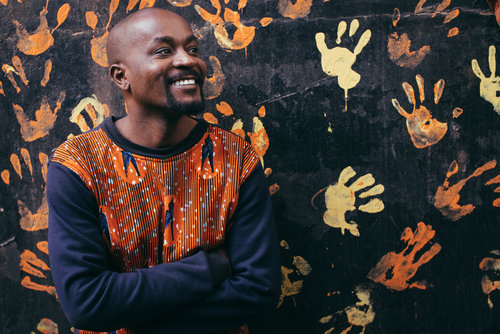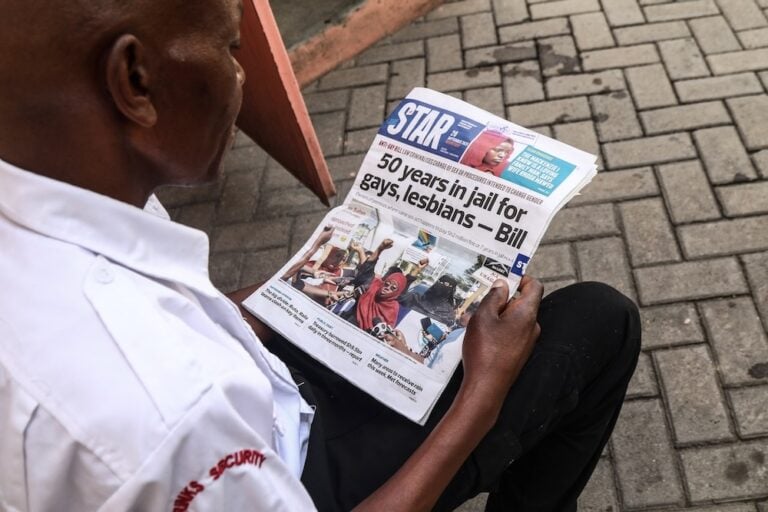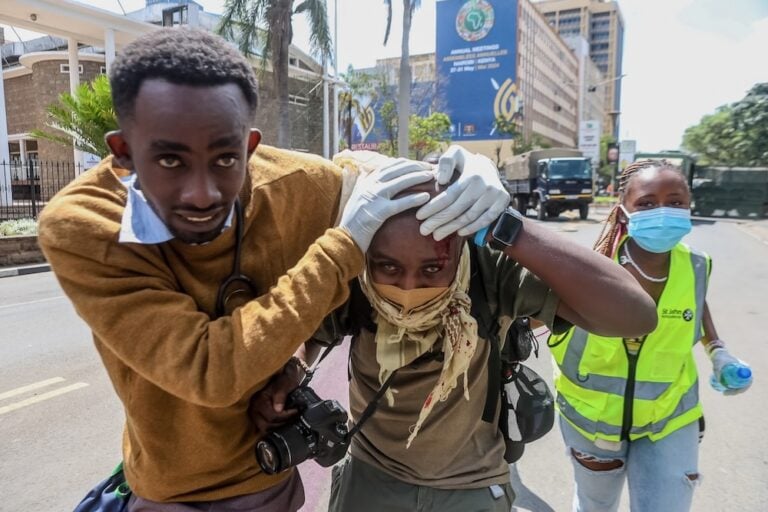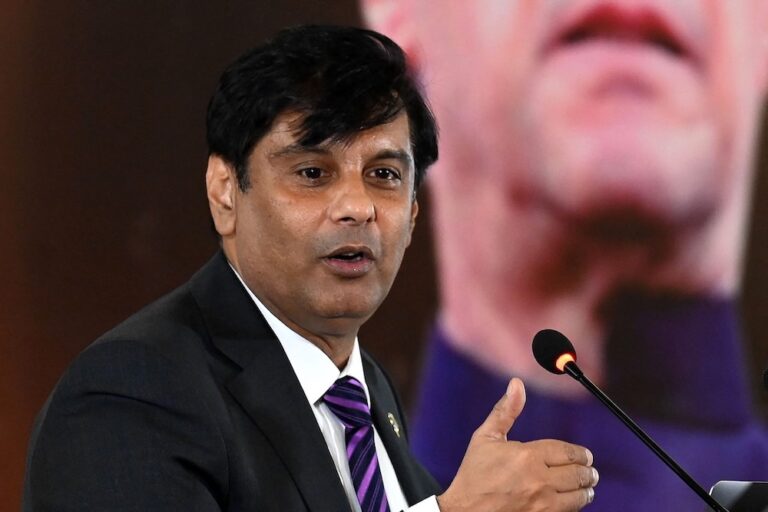LGBTQI+ people can face up to 14 years in prison in Kenya, just for having sex. Undaunted by this harsh reality, one organisation is taking its fight right to the courts, and turning the tide for LGBTQI+ rights across the continent in the process.
Imagine being told that you could spend 14 years in prison for having sex. Think about that. For many Kenyans, this is the stark reality.
Section 162 of Kenya’s penal code criminalises “carnal knowledge against the order of nature”, making life for LGBTQI+ people not only difficult, but dangerous.
Kenya is not the only place where this kind of legislation exists. In fact, more than 70 countries around the world criminalise homosexuality to varying degrees.
What makes Kenya stand out, however, is the courageous struggle being fought by LGBTQI+ activists for legal rights. At the forefront of this battle is Eric Gitari, lawyer and Executive Director of the National Gay and Lesbian Human Rights Commission (NGLHRC).
Since its creation in 2012, NGLHRC has increased public understanding of LGBTQI+ legal rights, won a 3-year legal battle to have its organisation officially registered with the NGO Coordination Board, and filed a constitutional challenge against Section 162 of Kenya’s penal code.
IFEX interviewed Gitari to learn more about the human impact of Kenya’s anti-homosexuality legislation, the complexities of legal activism, and the impact NGLHRC’s work could have on other countries.
How does Kenya’s homophobic legislation influence public opinion towards LGBTQI+ persons?
Eric Gitari: We have noted that the public message that the state conveys to society through this law is: (sexual and gender non-conformers) “are criminals, treat them as you would a criminal”. The law in Kenya is often couched with phrases like “unnatural offenses,” “carnal knowledge against the order of nature,” or “indecent acts”.
The law has shaped a stigma within the public opinion by forcing many to deny profound personal characteristics that are definitive of self, or to come out and risk arrest and prejudice.
This denial has reduced their wholeness, agency or well-being. This has then translated into reduced or less-than-optimal public participation in society, or powerlessness.
This messaging informs society to view LGBTQI+ persons with stain and prejudice. Its effects have been, and continue to be, violence, discrimination and death.
What is the human impact of Kenya’s homophobic legislation?
Powerlessness is a problem; it diminishes the agency of LGBTQI+ persons and movement organizing within the ongoing struggle for justice.
It causes internal strife between LGBTQI+ groups for resources and programs. The powerlessness is evident and present in the continued laxity by many of our legal aid clients to pursue redress or justice. For example, 90% of our blackmail cases reported by gay, bisexual and Men who have Sex with Men (MSM) ended up closing without judicial redress because the clients were unwilling to report to the police.
The reduced agency also causes irresponsible sexual behaviours, poor mental health, and low uptake of socioeconomic services such as education, healthcare and employment. We have noted more direct stigma and discrimination patterns in these socioeconomic spheres between non-state actors than direct discrimination from the state.
Why is litigation an effective avenue for LGBTQI+ rights activism?
When we set off in 2012, local LGBTQI+ organizing was mainly pursuing the methodology of public health as an entry point to highlight issues of LGBTQI+ discrimination.
With our venture in strategic litigation, we have noted a growing appreciation by our clients that the courts can deliver justice to the needs of the oppressed. For example, in 2013, it was Eric Gitari vs. the NGO Coordination Board. In 2015, two of our legal aid clients – who were subjected to anal testing – agreed for us to represent them at the High Court using their names in open court proceedings. In April 2016, six individual activists put their names on record enjoining the decriminalization petition. This included filing affidavits to share with the court and the public their lived experience with discrimination on account of the anti-gay sections of law described above.
We have also noted that in 2016, organisations who had opposed our litigation methodology with a human rights approach in 2013, joined the litigation methodology by also going to court seeking decriminalisation. Our networks of paralegals have been reporting increased ability to resolve cases of arbitrary arrest by police through using legal knowledge we availed to them.
In 2015, the Kenya High Court ruled that your organisation could formally register with the NGO Coordination Board. What did this victory signify for you and the LGBTQI+ community at large?
This unanimous decision by three superior judges of the Constitutional Division of the High Court was groundbreaking, a watershed for queer litigation in Africa and for freedom of association as a right which is to be enjoyed by all, regardless of one’s sexual orientation and gender identity.
What led to this success?
We were keen to make sure we had the evidence of the NGO Coordination Board’s decision not to reserve our registration written down. We tried six times and they kept refusing to formally write a letter [explaining] why they would not reserve the name of our organisation. We wrote a formal request for an explanation. That was when, in the board’s response, they indicated we all needed guidance by the courts on the matter.
We also leveraged the importance of freedom of association in the history of Kenyan democracy. During the one-party state, forming another political party was treason; the journey to democratize Kenya and get the constitutional freedoms that started in 2010 was painful and our society recalls it. We sought to remind people why we enacted the new constitution, to decree to all persons in Kenya and generations to come: human dignity, equality and freedom.
Would you say this sets a precedent for similar cases in Africa?
It’s an authority that was cited severally in Botswana when their Court of Appeal allowed LeGaBiBo (Lesbians, Gays and Bisexuals of Botswana) to register recently. It is also an authority we have noted is being used in Uganda by SMUG (Sexual Minorities Uganda) who have gone to court to seek registration.
What other NGLHRC initiatives have proven to be successful?
We have served over 3,000 legal aid clients, trained over 700 civic educators and over 250 paralegals. We have also trained more than 100 police officers and court users’ committee members on justice challenges and needs of the LGBTQI+ persons. We have been documenting trends and patterns from the legal aid clinic reports as well as evaluating feedback from the training engagements.
Some of the feedback has allowed us to start targeted and regular programmes for marginalized groups within the LGBTQI+ legal service provision such as lesbian, bisexual and queer women and LGBTQI+ refugees in Kenya.
What inspired you to file a petition challenging Section 162 of the penal code?
We have noted that the continued existence of criminal sanctions against private expressions of same sex intimacy between consenting adults is a barrier to equality.
This punitive law continues to inform policy decisions and shapes public opinion. It justifies the othering of LGBTQI+ individuals in Kenya, their disadvantageous treatment, and their direct and indirect indictment that they are outside the universe of equals in terms of public participation and inclusion.
What advice would you give to other groups trying to challenge or repeal legislation affecting LGBTQI+ people?
Start with what you have in your constitutions and test the unfair administrative state decisions that are affecting you. Make sure you document your evidence. Reach out to allies because you are never alone, there is a universe of help around you; just make the big leap. Inform your allies about your strategy and thinking around the action you want to launch; but remember: you do not need their consent, as long as they know your analysis. Also remember to have the courage to lead from the front and disregard internal movement strife that affects many minority groups.

REUTERS/Antony Njuguna (KENYA)



